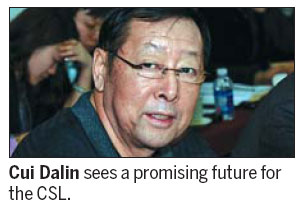Soccer's bad, but it's getting better
 0 Comment(s)
0 Comment(s) Print
Print E-mail China Daily, March 14, 2012
E-mail China Daily, March 14, 2012
Cui Dalin, a former deputy director of China's State General Administration of Sport, said soccer "has supplied fewer highlights than other sports" recently and that there was "nothing to be pleasantly surprised with", but that the game was moving in the right direction.
The 2012 Chinese Super League (CSL) kicked off last weekend with great fanfare following the signing of several international stars, and Cui, who retired from his post in 2010, said the large investments by clubs was great for China's soccer.
|
|
"Now the society has a big reason to support soccer, which is an extremely good thing," said Cui at the Fifth Plenary Session of the 11th Chinese People's Political Consultative Conference (CPPCC) last week.
"There should always be several elite clubs to compete in a country's league. It will benefit China's soccer in the long run," said Cui, who is a CPPCC member.
The CSL began its ninth season on a high note on Saturday, three days after its defending champion, Guangzhou Evergrande, trounced South Korean champion Jeonbuk Motors 5-1 in an away AFC Champions League clash.
It was the biggest margin against a South Korean team in many years and has offered some hope of a revival of the Chinese league, which has seen many soccer officials and referees jailed in bribery scandals.
Evergrande set the stage for the signing of big names when it acquired Dario Conca, the former Brazilian league MVP from Argentina, for $10 million last year.
Meanwhile, Cui said the anti-corruption campaign was equally beneficial to the league.
"The involvement of the judicial department has helped clean up China's soccer environment, and create fair conditions for all," Cui said. "We cannot say such corruption cases will ever be totally avoided in the future, but things have to be improved gradually. Setting up strict rules to ensure fairness will lead China's soccer into a positive cycle."
China launched its crackdown on match fixing in 2009, hoping to root out gambling, bribery and other forms of corruption that are blamed for sapping the competitiveness of the sport.
However, the league's problems date back to at least 2001, when allegations of match fixing and the bribing of referees first emerged.
During recent years, China's performance on the international stage has further slumped and the game's popularity lost ground to basketball as young players turned away from the sport in droves.
China failed to qualify for the 2014 World Cup - for the third time in a row.
In Cui's opinion, these problems were festering since the beginning of China's professional league in 1992.
"Before soccer became professional, each local sports bureau had its own reserve teams of different age groups. But after the professional league started, soccer has been put into the general market and the building up of the reserve teams is no longer the task of local sports authorities, but the pro clubs," Cui said.
"The professional league, at first, was not mature and some investors only cared about short-term profit. Therefore, the build-up system for the reserve teams gradually disappeared.
"The bad system has come to light in recent years - the players of the national team didn't have fine skills and the game here lagged behind. It meant our soccer could not meet the requirements of modern competitions."
Improving Chinese soccer was a hot topic during this year's CPPCC session, which concluded on Tuesday.
The owner of Beijing Evergrande, Xu Jiayin, also a CPPCC member, radically proposed that the Chinese Football Association (CFA) give up the responsibility of running the domestic leagues and instead make an effort to enlarge the soccer population.
Cui applauded that plan, and was happy to see the CFA had already taken the first step.
Last month, the CFA, which was formerly in charge of nearly every aspect of the CSL and the second division, announced a plan to transfer some of the responsibility for running the domestic leagues to a professional league council.
"The pilot plan will be implemented for a year to seek further improvement. All the reforms should be done gradually and not carried out in a hurry," Cui said.






